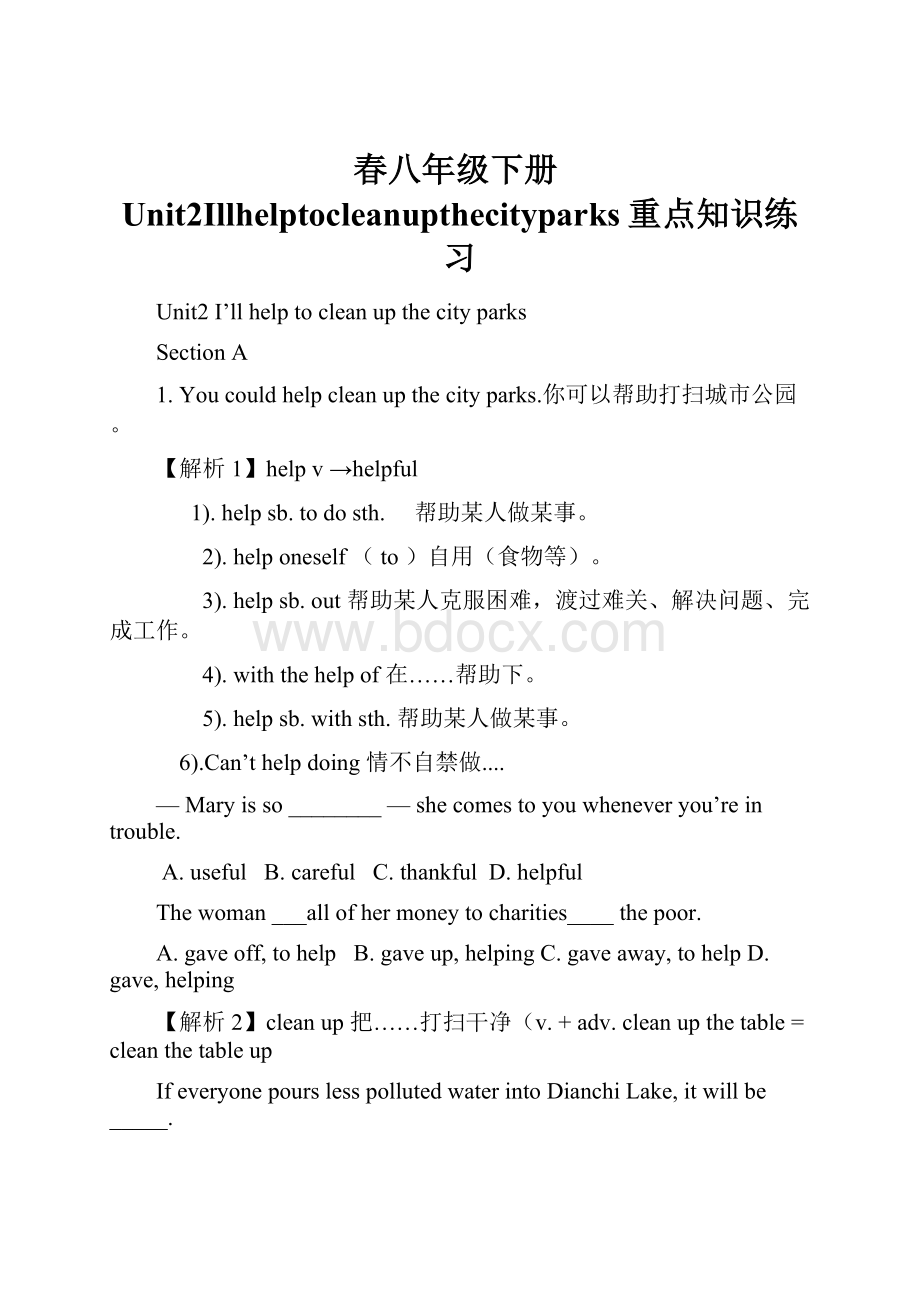春八年级下册Unit2Illhelptocleanupthecityparks重点知识练习.docx
《春八年级下册Unit2Illhelptocleanupthecityparks重点知识练习.docx》由会员分享,可在线阅读,更多相关《春八年级下册Unit2Illhelptocleanupthecityparks重点知识练习.docx(41页珍藏版)》请在冰豆网上搜索。

春八年级下册Unit2Illhelptocleanupthecityparks重点知识练习
Unit2I’llhelptocleanupthecityparks
SectionA
1.Youcouldhelpcleanupthecityparks.你可以帮助打扫城市公园。
【解析1】helpv→helpful
1).helpsb.todosth. 帮助某人做某事。
2).helponeself(to)自用(食物等)。
3).helpsb.out帮助某人克服困难,渡过难关、解决问题、完成工作。
4).withthehelpof在……帮助下。
5).helpsb.withsth.帮助某人做某事。
6).Can’thelpdoing情不自禁做....
—Maryisso________—shecomestoyouwheneveryou’reintrouble.
A.usefulB.carefulC.thankfulD.helpful
Thewoman___allofhermoneytocharities____thepoor.
A.gaveoff,tohelpB.gaveup,helpingC.gaveaway,tohelpD.gave,helping
【解析2】cleanup把……打扫干净(v.+adv.cleanupthetable=cleanthetableup
IfeveryonepourslesspollutedwaterintoDianchiLake,itwillbe_____.
A.deeperanddeeperB.cleanerandcleanerC.dirtieranddirtierD.widerandwider
2.Thegirlcouldvisitthesickkidsinthehospitaltocheerthemup.女孩可以去医院看望生病的孩子们,让他们振作起来。
【解析1】sick/ill:
(1)sickadj.“生病的”,既可放be(系动词)后作表语,也可放n.前作定语。
besickof…“讨厌;厌恶……”sickperson=patient“病人”
(2)illadj.“生病的”,只能放be(系动词)后作表语,beillinhospital生病住院
ill→illnessn.“病;疾病”
①.Youlookverytired.Youmustbesick.(=ill)
②.Hehadasickmother.他有一位生病的母亲
Ithinkher(ill)isveryserious.我认为她的病是很严重。
()
The___girlwassenttohospitalbyhermotheryesterday.
A.sickB.illC.goodD.well
【解析2】inthehospital与inhospital
(1)inthehospital“在医院”指人在医院里,允许是在医院上班,允许是到医院看望病人等;
(2)inhospital“在医院;住院”指生病住院。
类似的短语有:
inthebed“在床上”,也许是蹲在床上或站在床上;inbed“在床上”指躺在床上
Tomisillandstayinginbed.
—Mygrandfatherwasill_____lastweek.—I’msorrytohearthat.
A.inahospitalB.inthehospitalC.inhospitalD.inhospitals
【解析3】cheerup使振奋,使高兴的(v.+adv)
cheersb.up=makesb.happy使某人高兴cheermeup使我高兴
()①Youcouldvisit_____childreninthehospitaland_____them______.
A.ill,set,upB.sick,clean,upC.sick,cheer,up
()②Helookssad.Let’s___him___.
A.cheer,upB.put,upC.setupD.call,up
—Helooksunhappytoday.—Let’s.
A.cheerhimupB.helpouthimC.lookhimafterD.arguewithhim
3.Theboycouldgiveoutfoodatthefoodbank.男孩可以在食物站分发食物
【解析】giveout=handout分发(v.+adv)handoutbananas
giveoutsthtosb.分….给某人
【短语】:
givein屈服giveback=return归还giveaspeech发表
givesb.acall给……打电话
giveaway赠送giveawaymoneytokids
givesb.ahand=helpsb.帮助某人
giveupdoingsth=stopdoingsth放弃做某事giveupsmoking放弃吸烟
givesb.sth=givesthtosb.给某人某物
givememoney给我钱=givemoneytome给我线
①Youshouldn’t_____yourhope.Everythingwillbetter.
A.giveupB.fixupC.cheerupD.putup
②Wehaveraisedsomebooks.We’ll___tothepoorchildren.
A.putthemupB.givethemawayC.givethemaway.D.putoutthem
8.ManysocialworkerswenttoYa’antohelpcleanwaterandfoodtolocalpeopletoreducetheirpainfromtheearthquake.
A.putoutB.comeoutC.workoutD.giveout
4.WeneedtocomeupwithaplanfortheCityParkClean-upDay.
我们需要为城市公园清洁日想出一个计划。
【解析】comeupwith=thinkup想出catchupwith 赶上追上
【短语】:
thinkabout考虑thinkof想起thinkover仔细考虑
【谚语】Thinkbeforeyouact三思而后行
【拓展】v+upwith构成的短语:
catchupwith赶上;追上keepupwith跟上;跟、保持联系
putuwith容忍;忍得住endupwith结束;以.......而结束
5.Oh,whatdidtheyaskyoutohelpoutwith?
哦,他们让你帮助做些什么?
【解析】helpout帮助;帮助......出来helpsb.out使某人脱离困境
24.He______plentyofmoneytothepeopleintheearthquakearea______.
A.putout,toworkoutwellB.handedout,helpthemout
Cgaveout,workoutwellD.gaveaway;tohelpthemout
6.Theytoldmestoriesaboutthepastandhowthingsusedtobe.
他们给我讲过去的故事,并告诉我过去事情是什么样子的。
【解析1】
(1)usev.使用→usefuladj.有用的useup用完StudyingEnglishis_________(use).
(2)usesthtodosth用某物做某事WeuseInternet__________(find)information.
(3)usedtodosth过去常常做某事,表示过去做过的事现在已经不做,只用于过去时态。
①Mymotherused_________(tell)usstorywhenwewereyoung.
()②Heusedto____shortand____shorthairwhenhewasyoung.
A.have;beB.be;haveC.be;beD.have;have
(4)be/getusedtodoingsth习惯于做某事
Mygrandpaisused___________(live)incountry.
(5)beusedtodosth被用来做某事=beusedfordoingsth
①Stampsisused____________(post)letters.
()②Mybrotherusedto_____uplate,butnowheisusedto___upearly.
A.get;getB.getting;getC.get;gettingD.getting;getting
()③Keysareused___thedoor.
A.toopenB.toopeningC.openD.opening
【记】Heusedtowearglasses.Butnowheisusedtowearingcontactlenses.
他以前常戴(框架)眼镜,但现在习惯戴隐形眼镜。
【2013湖北随州】33.–HowdoesJackusuallygotowork?
—He______driveacar,butnowhe______theretoloseweight.
A.usedto;isusedtowalkB.wasusedto;isusedtowalking
C.wasusedto;isusedtowalkD.usedto;isusedtowalking
【2013四川雅安】20.Myparentsgettingupearlyonweekdays
A.usedtoB.beusedtoC.wasusedtoD.areusedto
【2013黑龙江龙东】30.Shelivewithhergrandparents,butshedoesn’tnow.
A.usedtoB.isusedtoC.wasusedto
【2013贵州安顺】18.She____livealone.Butshe_____livingalonebecauseshefeelslonely.
A.usedto;doesn’tusedtoB.isusedto;wasusedto
C.usedto;isnotusedtoD.wasusedto;doesn’tusedto
7.Thatsoundsinteresting.那听起来挺有趣。
【解析】sound
(1)n声音Weheardastrangesound.
【辨析】Sound/noise/voice
sound(n.)指自然界中所有的声音,可指悦耳的声音也可指噪音。
noise一般指很响的,刺耳的声音,即喧闹,嘈杂声等。
voice指人通过发音器官发出的声音(包括说话,唱歌等)。
Maryhasabeautifulvoice.玛丽的声音很美。
Don'tmakesuchanoise.别这样大声喧哗。
—Didyouhearanystrange_____whenthequakehappened?
—No,Iwasinmygardenwithmyflowers
andwasenjoyingthebeautiful
_____ofmybirdsatthattime.
A.voice;noiseB.noise;soundC.whisper;soundD.sound;voice
(2)vi.听起来,似乎,其后加表语(形容词,介词短语,名词)
—Howdoesthemusicsoundtoyou?
这音乐你听起来怎么样?
—Itsoundsbeautiful.它听起来很美。
—DoyouknowthesongGangnamStyle?
—Ofcourse.It________interesting.
A.tastesB.smellsC.soundsD.feels
8.Yeah,alotofoldpeoplearelonely.是的,很多老年人都很孤独。
【解析】alone/lonely辨析:
(1)alone=byoneselfadj.单独的,指无人陪伴的客观事实,不带感情色彩。
Heoftenwalksalonetohome.
(2)lonely①指人孤独的,寂寞的,强调主观感受;②也可指某个地方是荒凉的
()①Theoldmanlives___,butheneverfeels____.
A.alone;lonelyB.lonely;aloneC.alone;aloneD.lonely;lonely
()②Mylittlesisterisafraidtostayathomealone.
A.quietlyB.lonelyC.allthetimeD.byherself
()③Hedidtheworkallbyhimself.
A.alreadyB.togetherC.aloneD.Lonely
【2011雅安】12.Hisgrandparentslive____inasmallhouse,buttheydon’tfeel_______.
A.lonely;aloneB.alone;lonelyC.lonely;lonelyD.alone;alone
【2012贵州安顺】22.Hisgrandparentslive____inasmallhouse,buttheydon’tfeel_____.
A.lonely;aloneB.alone;lonelyC.lonely;lonelyD.alone;alone
【2013上海】67.MyoldneighborCharlesfelt_______afterhischildrenmovedout.
A.lonelyB.safelyC.angrilyD.happily
9.Weshouldlistentothemandcareforthem.我们应该倾听他们说话并且关心他们。
【解析】carefor照看;照顾;照料
33.Manystudentsinourschool_______theoldandtheyusuallyoffertheirseatstothemonbuses.
A.worryaboutB.careforC.agreewithD.takecare
【拓展】care的短语总结
takecare=becarefulv.当心,小心takecareof=lookafterv.照顾,照料,照看
takecareof处理,做完careforv.照顾,照看
Thanksforyourinvitation,butI’msosorryIcan’tgo.Ineedto______mybabyathome.
A.takeawayB.takeoffC.takecareofD.takeoutof
10.MarioGreenandMaryBrownfromRiversideHighSchoolgiveupseveralhourseachweektohelpothers.来自河畔高中的马里奥。
格林和玛丽每周都会花几个小时去帮助别人。
【解析1】giveup放弃giveupdoingsth=stopdoingsth放弃做某事
()IfindittoodifficulttolearnEnglishwell.Iwanttodropit.
A.giveupitB.giveitupC.giveawayitD.giveitaway
—It'stoohardformetobeatrailwalker.—Never________.Believeinyourself!
A.putupB.giveupC.hurryupD.lookup
Itwasadifficulttimeforthequake-hitvictimsinYa'an,buttheydidn't________hope.
A.giveupB.giveoffC.giveinD.giveout
AndreaBocellinever,whichmakeshimasuccessfulsinger.
A.takesawayB.givesawayC.getsupD.givesup
Althoughmanygreatpeopleeverfailed,theynever____andmanagedtosucceed.
A.setoutB.stayedupC.keptonD.gaveup
ThepeopleinYa'anhavemetlotsofdifficulties,buttheyhaven’t__________hope.
A.pickedupB.givenupC.lookedforD.waitedfor
—DiaoyuIslandbelongstoChina.—Surelyitdoes!
WeChinesewillneveritup.
A.cutB.fixC.giveD.set
【解析2】several 可作定语,表示“几个”:
=afew
Several boys were injured. 有几个小伙子伤了。
My friend speaks several languages. 我的朋友能讲几种语言
11.HevolunteersatananimalhospitaleverySaturdaymorning.
12.他每周六早上在动物医院做志愿者。
【解析】volunteerv志愿n志愿者volunteertodosth志愿做某事
①Jackvolunteered_________(carry)thewater.
②Theyoften___________________(自愿去教)thechildren
12.ButIwanttolearnmoreabouthowtocareforanimals...但是我想学习更多的关于如何照顾动物的知识
【解析】“疑问词+不定式”作及物动词的宾语,
【记】:
Idon’tknowwhattodo.Idon’t’knowhowtodoit.Idon’tknowwhattodowithit.
【拓展】“特殊疑问词+不定式”与“wh–从句的转换。
转换时只需在疑问词后加主语(与主句主语一致),并将不定式改成“should+v原形“做谓语。
Idon’tknowhowtosolvetheproblem.=Idon’tknowhowIshouldsolvetheproblem.
①Idon’tknowwhat_________(bring)totheparty.
②Hewantedtoknowwhen_________(go).
—Whichdressdoyoulikebest,Madam?
—Sorry,Ican’tdecide_____now.
A.tobuywhichoneB.buywhichoneC.whichonetobuyD.whichIshouldbuyit.
13.IgetsuchastrongfeelingofsatisfactionwhenIseetheanimalsgetbetterandthelookofjoyontheirowners’faces.当我看到动物们变得更好,并且它们的主人的脸上呈现喜悦之情时,我有一种很强烈的满足感。
【解析1】such
词条
词性
用法
常用结构
such
形容词
修饰名词
sucha/an+形容词+可数名词单数
no/any/some/all/many等+such+名词
such+除many/few之外的形容词+可数名词复数
s